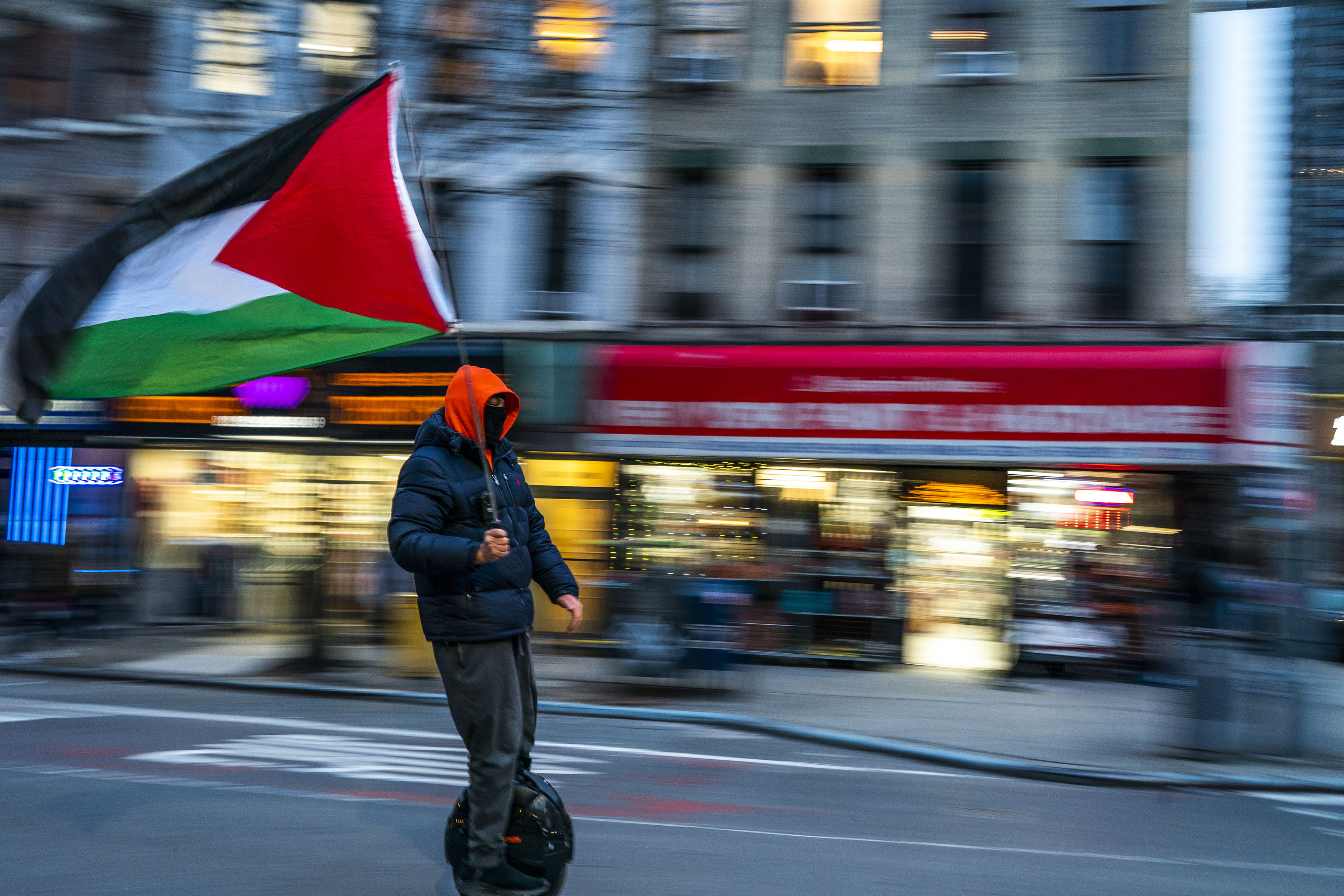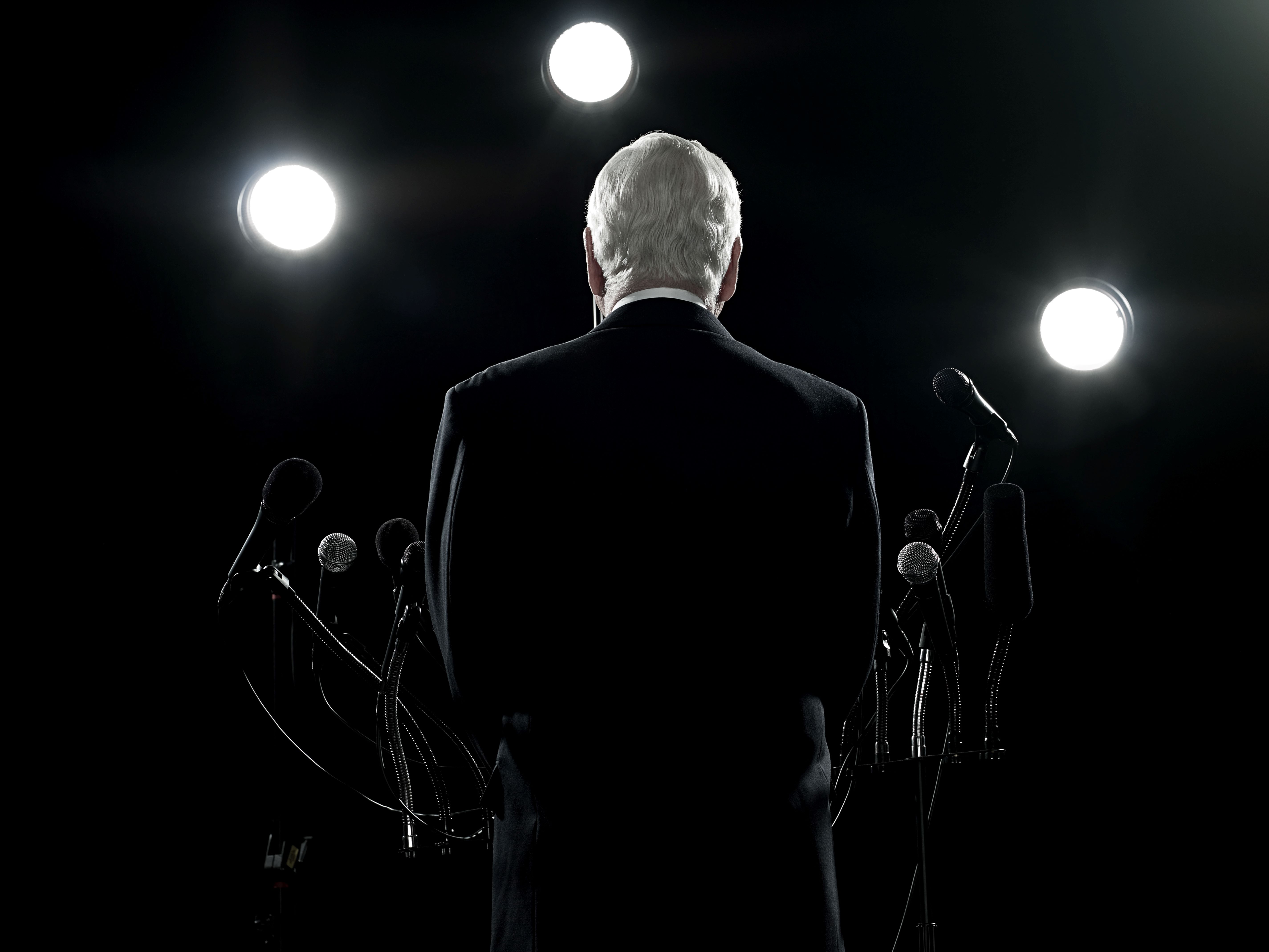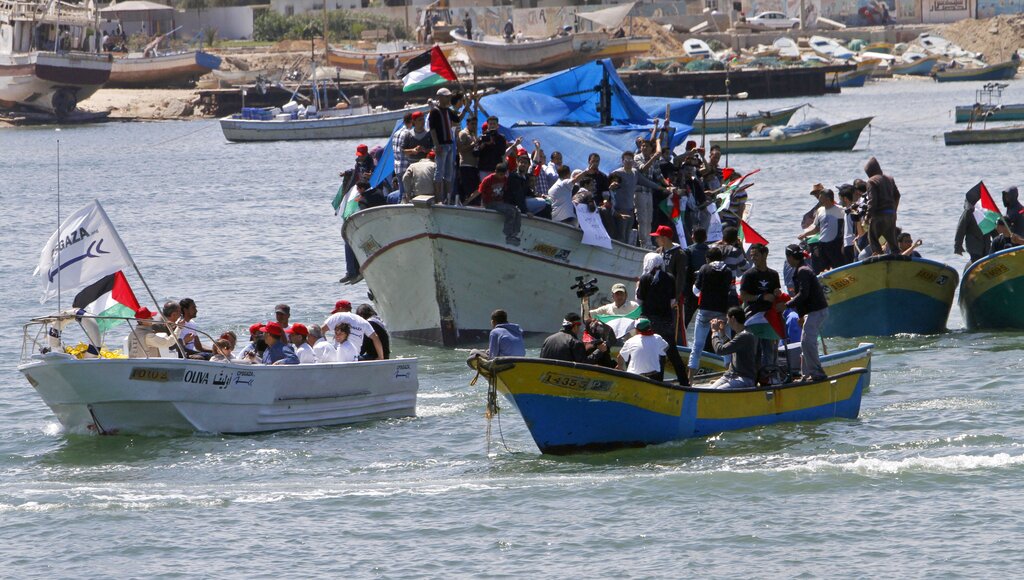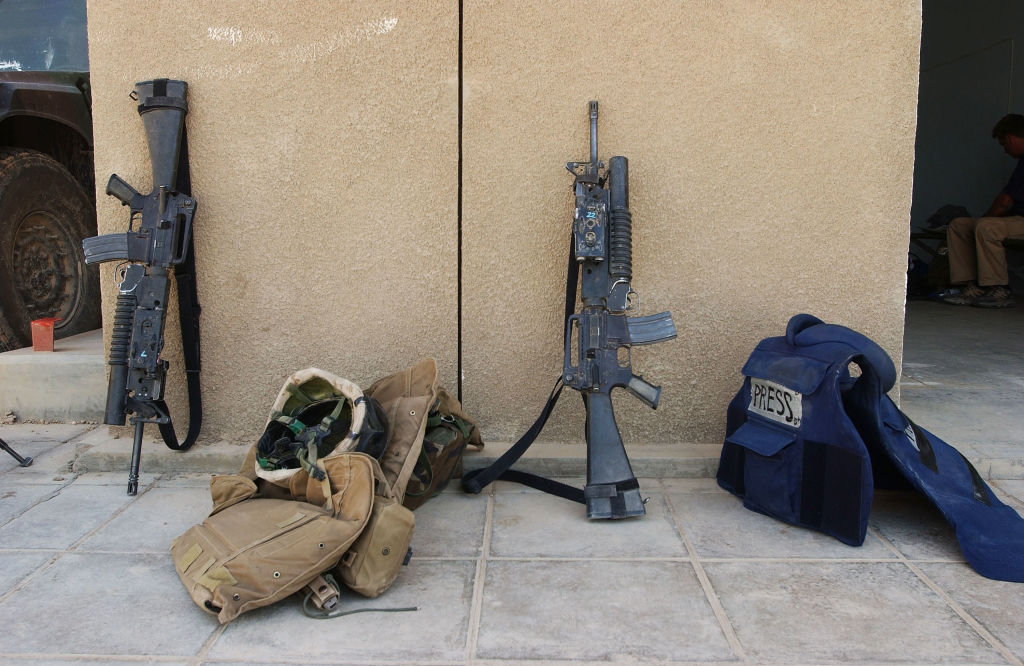لم يكن انحياز الإعلام الغربي في تغطيته لحرب الاحتلال الإسرائيلي على الشعب الفلسطيني جديدا أو غريبا، لكنه كان صادما في درجته، ولا سيما مع حجم الجرائم التي يرتكبها على مدار الساعة طوال أشهر.
كُتب كثيرا عن السلبيات التي شابت تغطيات الإعلام الغربي للحرب على غزة، ولا سيما في الأسابيع الأولى من الحرب، لكن اللافت أن عمل مراسلي الفضائيات الغربية الميدانيين يبدو متشابها إلى حد بعيد مع وقائع مضى عليها أكثر من 20 عاما.
رغم أن المراسل من المفترض أن يكون عمله ميدانيا، فإن الإعلام الغربي اكتفى بإرسال مراسلين للذهاب بصحبة قوات الاحتلال، ومن البدهي ألا تسمح إسرائيل لهم بنشر روايات تتناقض مع سرديتها، إلا أن هذا لم يردع وسائل الإعلام الغربية عن الخضوع للشروط الإسرائيلية. لقد أدى ذلك إلى جملة من الأخطاء المهنية؛ مثل تورط مراسل قناة فوكس نيوز في تصوير مشهد تمثيلي للقبض على مقاتل من حماس، ليتضح أن هذا المقاتل المزعوم ليس إلا أحد جنود الاحتلال، وأن المشهد كله مفبرك. كما انتشرت مشاهد لمراسلين أجانب ينبطحون أرضا ويزعمون أنهم يتعرضون لقصف صاروخي من جانب المقاومة الفلسطينية، بينما يظهر آخرون في الكادر وهم يسيرون بهدوء.
من بدهيات التغطية الميدانية في الحروب تخصيص مراسلين لتغطية الحرب على الجبهتين المتقاتلتين، إلا أن أغلب وسائل الإعلام الغربية اكتفت بالتغطية من الجانب الإسرائيلي، بينما وضعت بعضها مراسلين على حدود قطاع غزة.
ثم كانت السقطة الكبرى عندما رافقت مراسلة بي بي سي قوات الاحتلال أثناء اقتحامها مستشفى الشفاء شمالي غزة، وأخذت تستعرض معهم ما يزعمون أنها مضبوطات عثروا عليها، وهي رواية أشبعها العالم نقدا وسخرية من تهافتها وتناقضها وعدم تناسبها مع السيناريوهات التي سوّقها الاحتلال لما كان يزعم أنها مقرات لقيادات حماس تحت المستشفى.
من بدهيات التغطية الميدانية في الحروب كذلك، تخصيص مراسلين لتغطية الحرب على الجبهتين المتقاتلتين، إلا أن أغلب وسائل الإعلام الغربية اكتفت بالتغطية من الجانب الإسرائيلي، بينما وضعت بعضها مراسلين على حدود قطاع غزة، ولكن من الجانب الإسرائيلي كذلك! للإيحاء بتقديم تغطية متوازنة. كما ظهر بعض المراسلين من الفنادق التي يقيمون فيها بإسرائيل للحديث عن تطورات الحرب على غزة، وهو ما يتناقض مع الغرض من عملهم الميداني.
يظهر هذا الانحياز من البداية، حين ترسل وسائل الإعلام الغربية مراسلين أجانب لتغطية الأحداث في الشرق الأوسط، فأغلبهم لا يجيدون اللغة العربية ويعرفون الشيء القليل عن تعقيدات المشهد السياسي والاجتماعي والاقتصادي والعسكري للمنطقة.
من المهم توثيق الأخطاء المهنية التي تورط بها الإعلام الغربي في هذه الحرب، لكن الأهم إخضاع الأداء الإعلامي الغربي لتحليلات أعمق، والنظر إليه من زوايا متعددة، ومنها المنظور التاريخي، الذي يحلل الظواهر استنادا إلى خبرات سابقة، وذلك لمقارنتها بالواقع الحالي، سواء من ناحية التشابه أو الاختلاف.
يظهر هذا الانحياز من البداية، حين ترسل وسائل الإعلام الغربية مراسلين أجانب لتغطية الأحداث في الشرق الأوسط، فأغلبهم لا يجيدون اللغة العربية ويعرفون الشيء القليل عن تعقيدات المشهد السياسي والاجتماعي والاقتصادي والعسكري في هذه المنطقة من العالم، وهو ما يؤدي إلى تغطيات سطحية تعج بالصور النمطية والتحليلات الاستشراقية. والجدير بالذكر أن الجزيرة تميزت منذ انطلاقتها عام 1996 بتلافيها هذه النواقص؛ إذ وظفت مراسلين محليين متخصصين لتغطية الأحداث الكبرى التي تتسم بالتعقيد، وهو ما منحها نقطة قوة ميزتها عن غيرها من الشبكات الإخبارية العالمية.
وفي سياق اللجوء إلى المنظور التاريخي لتحليل أداء الإعلام الغربي، لن نجد نماذج دالة أكثر من الحرب على أفغانستان عام 2001، والحرب على العراق عام 2003، فخلال هذين الحدثين ظهر جليا الانحياز الإعلامي الغربي لصالح الولايات المتحدة، وتبني سرديات الإدارة الأمريكية ومزاعمها بشأن أسباب الحرب ومجرياتها في البلدين، كما ظهر دور الجزيرة وأهميتها في مواجهة هذا الرغبة في التعتيم على الحقيقة.
حرصت الإدارة الأمريكية على الحصول على تأييد وسائل الإعلام للحرب في أفغانستان، كما حرصت أن تكون روايتها للأحداث هي السائدة، وكان البنتاغون يولي اهتماما غير مسبوق بالإعلام. ومن أجل تحقيق ذلك اتبعت الإدارة الأمريكية عددا من الإستراتيجيات، منها السيطرة على وسائل الإعلام من خلال قوانين رقابية لحملها على تقديم تقارير متفقة مع مصالحها، إضافة إلى محاولة "تحييد" وسائل الإعلام التي تحاول نقل صورة ما يجري على أرض الواقع، وهو ما تجلى على سبيل المثال في قصف القوات الأمريكية لمقر قناة الجزيرة في العاصمة كابول.
وفي حرب العراق، طبق الجيش الأمريكي آلية مراقبة جديدة عن طريق ضم الصحفيين إلى القوات في الميدان، والسماح لهم بالانضمام للوحدات العسكرية وتخصيص أماكن لهم داخل الدبابات وقواعد الجيش، بعد إخضاعهم لشروط قاسية قبل الموافقة على مشاركتهم، أهمها عرض الصور على الرقابة أولا للحصول على موافقة قبل إرسالها إلى مركز البث، ومن ثَمّ فقد تأثر عمل هؤلاء بالرواية الرسمية إلى حد بعيد.
كان الصحفيون في النهاية جزءا لا يتجزأ من القوات الأمريكية والبريطانية، وأدى ذلك إلى تحول الإعلام الأمريكي إلى مجرد أداة دعاية لوجهة نظر إدارة الرئيس جورج دبليو بوش، فلم تكن ثمة أي أصوت ناقدة تراجع ادعاءات الإدارة الأمريكية بشأن العراق.
أما من لم يذهبوا مع القوات، فكانوا يقدمون تقاريرهم من ردهات الفنادق الآمنة نسبيا واعتمدوا على الجيش الأمريكي للوصول إلى سياق الأحداث. واشتكى صحفيون من القيود التي فرضت عليهم ومنعهم من تغطية الحرب في عدد من المناطق. وإذا كان الوضع الميداني حرجا، فإن الصحفيين يصبحون أول من يتعرض للإجلاء من أرض المعركة ليصبحوا غير قادرين على التغطية. كان الصحفيون في النهاية جزءا لا يتجزأ من القوات الأمريكية والبريطانية، وأدى ذلك إلى تحول الإعلام الأمريكي إلى مجرد أداة دعاية لوجهة نظر إدارة الرئيس جورج دبليو بوش، فلم تكن ثمة أي أصوت ناقدة تراجع ادعاءات الإدارة الأمريكية بشأن العراق.
كان هناك تبادل مصالح بين وسائل الإعلام والجيش؛ فقناة فوكس نيوز على سبيل المثال مملوكة لشركة جنرال إلكتريك إحدى أكبر شركات صناعة الأسلحة، كما كانت جوديث ميلر الصحفية التي ادعت وجود أسلحة دمار شامل بالعراق على علاقة قوية بديك تشيني نائب جورج بوش، وكان الرئيس نفسه وأعضاء إدارته يستشهدون بالأكاذيب التي تنشرها وسائل الإعلام الأمريكية عن العراق في خطاباتهم.
ومن أجل إبقاء خطوط الاتصال الخاصة بهم مع الإدارة أو البنتاغون مفتوحة، فإن على الصحفيين نقل وجهة النظر الرسمية والترويج لها. تجنب معظم المعلقين النقد وأضفوا الشرعية على الأعمال العسكرية الأمريكية. أما من حاولوا تقديم تغطية مختلفة، فكانت تُمارس عليهم ضغوط لإجبارهم على الالتزام بالرواية الرسمية، وهي ضغوط تنوعت اتجاهاتها بدءا من الحكومة مرورا بوسائل الإعلام نفسها.
لم تقدم وسائل الإعلام الأمريكية صورة شاملة ومتوازنة للحرب؛ إذ ركزت على التكنولوجيا العسكرية المتقدمة لدى الجيش الأمريكي، وقدمت الحرب من منظور رسمي وفي رسائل مصممة للجمهور في الولايات المتحدة، بينما ركزت الجزيرة ومثيلاتها من الفضائيات العربية على المعاناة الإنسانية والتدمير الذي لحق بالمدنيين العراقيين، وكان للشبكات العربية اتصالات أفضل على الأرض مع السلطات العراقية والمدنيين؛ لأن معظمهم يتحدثون العربية بسبب المعايير الثقافية والدينية والتاريخية المشتركة، وهو ما أظهر أهمية توظيف مراسلين محليين. وعلاوة على ذلك، حاولت الشبكات العربية التواصل مع جماهير مختلفة. أما الشبكات الأمريكية، فقدمت الحرب من منظور أمريكي وفي رسائل مصممة للجمهور في الولايات المتحدة.
بدت لغة الحرب على سي أن أن على سبيل المثال "لطيفة" ومجردة واشتملت على عبارات من قبيل: "الأهداف الناعمة" و"القصف البساطي" و"القنابل الزهرية". لكن لغة الحرب على الجزيرة كانت صريحة ولم تترك مجالا للشك في عقول المشاهدين بأن الناس سيقتلون جراء التدخل الأمريكي في أفغانستان والعراق. كما أن استخدام القناة في تغطيتها للصراعات والحروب صورا مباشرة يجعلها أقرب إلى تمثيل الواقع كما هو، ونقل وجهه الحقيقي بما يحمله من بؤس ومعاناة للضحايا والمهمشين، لكنها صور غالبا ما لا تجد طريقها إلى شاشات الإعلام الغربي لاعتبارات تتعلق بـ"عدم الملاءمة مهنيا".
ومن جديد، دفعت تغطية الجزيرة القيادة الأمريكية في الميدان وفي البيت الأبيض إلى محاولة إسكات صوتها أو تغيير نهجها من خلال ممارسة الضغوط السياسية والإعلامية، وتوجيه انتقادات واتهامات. وكما حدث في حرب أفغانستان، تُوِّجت الضغوط الأمريكية بقصف مقر الجزيرة في بغداد، وهو ما أدى إلى استشهاد مراسل الجزيرة طارق أيوب.
والمحصلة أن وسائل الإعلام الأمريكية فشلت في الاضطلاع بمسؤولياتها واستُخدِمت بوصفها أدوات للتلاعب والدعاية من قبل إدارة بوش في الترويج لحرب العراق، بسبب ارتباطها بدون رؤية نقدية بخطاب النخبة أو الدولة، ولا سيما في أوقات الحرب أو الأزمات السياسة الخارجية.
بعد هذا الاستعراض لما جرى قبل أكثر من عقدين، يمكن القول إن وسائل الإعلام الغربية تعيد السقوط في نفس ما تورطت به عامي 2001 و2003، لكن الفارق أنها لم تعد تسيطر على تدفق المعلومات وفقدت كثيرا من مصداقيتها، كما أسهمت الجزيرة ومواقع التواصل الاجتماعي في فضح جرائم الحرب الإسرائيلية المستمرة وحقيقة ما يجري في غزة، وهو ما أجبر بعض وسائل الإعلام على تغيير خطابها قليلا، لكن بعد فوات الأوان.
المصادر
- عزيز دواي، "القوة الناعمة لوسائل الإعلام الهجين: تلاقي وسائل الإعلام وتأثير الجزيرة"، في "الجزيرة في عشرين عاما: أثرها في الإعلام والسياسة والأكاديميا"، تحرير عز الدين عبد المولى ونور الدين الميلادي، مركز الجزيرة للدراسات، الدوحة، 2016.
- محمد الزياني، "سياسة التمثيل وثقافة الجزيرة الإخبارية"، في "الجزيرة في عشرين عاما: أثرها في الإعلام والسياسة والأكاديميا"، تحرير عز الدين عبد المولى ونور الدين الميلادي، مركز الجزيرة للدراسات، الدوحة، 2016.
























![A demonstration against Israel's war on Gaza on Paulista Avenue in São Paulo on November 4, 2023, draws attention to the deaths of children while the media focuses on the war against terrorists. [Photo: Lina Bakr]](/sites/default/files/ajr/2024/Picture1.png)



















